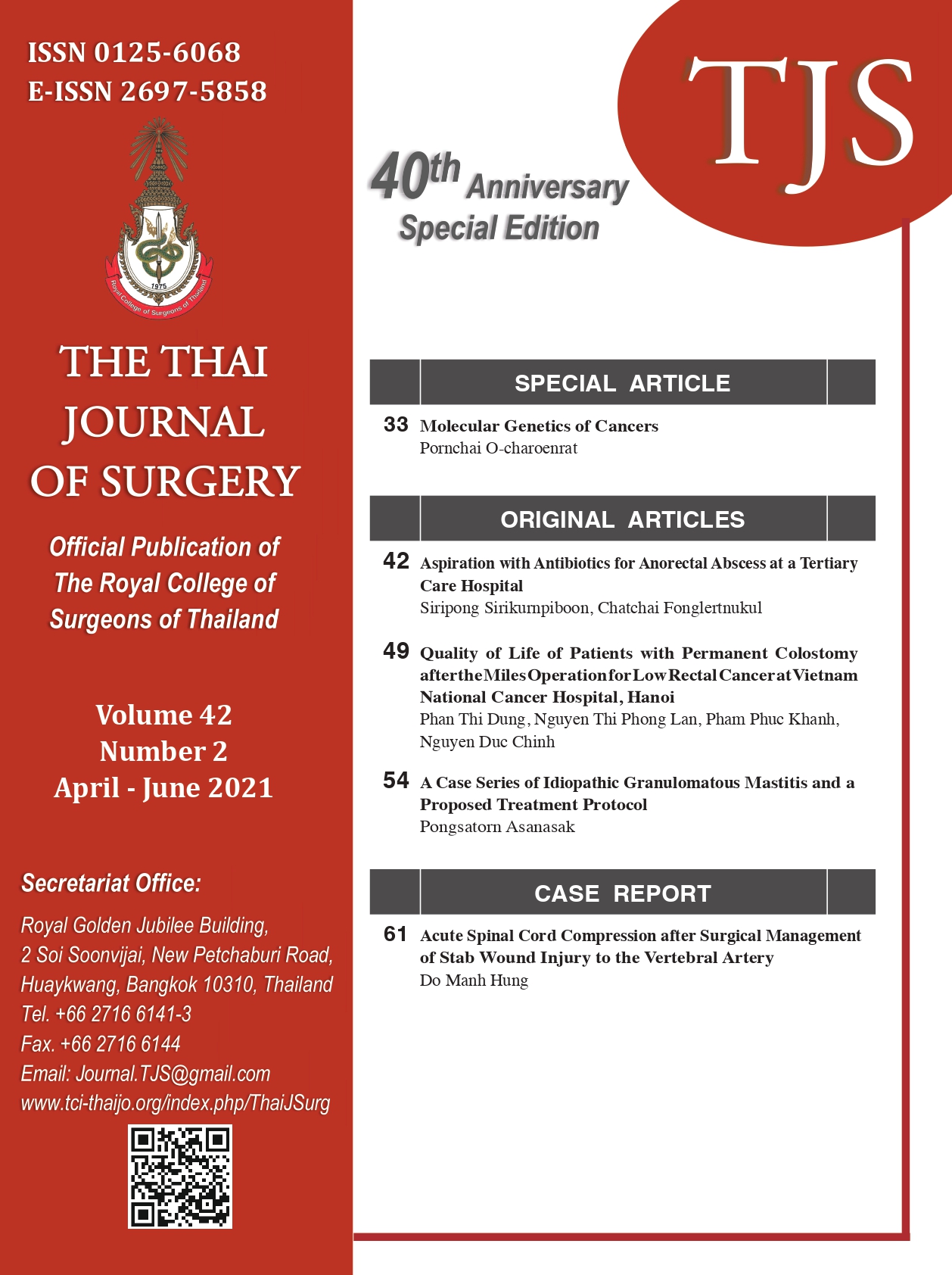Aspiration with Antibiotics for Anorectal Abscess at a Tertiary Care Hospital
An Aspiration Adult Perianal Abscess Result
Keywords:
Anorectal abscess, Aspiration, Antibiotic, Fistula-in-anoAbstract
Objective: Anorectal abscess is a common anorectal condition. Incision and drainage is standard treatment. Aspiration with antibiotics is an alternative in some cases, but evidence for its effectiveness is limited. The objective of the present study is to examine the results of aspiration with antibiotics for anorectal abscess, within 6 months of follow up. Factors associated with abscess recurrence and occurrence of fistula-in-ano were also examined.
Methods: Twenty patients with anorectal abscess who refused surgery and underwent aspiration with antibiotics were compared with 123 patients who underwent standard incision and drainage in a retrospective study. Outcomes included failure of treatment, the recurrence of perianal abscess and the incidence of fistula-in-ano.
Results: Demographic data were similar in both groups. In the aspiration and antibiotics group, 2 patients had treatment failure, 1 had recurrent abscess, but none had fistula-in-ano after 6 months of follow-up. In the incision and drainage group, 18 patients had recurrent abscess and 16 had fistula-in-ano.
Conclusion: Aspiration with antibiotics for anorectal abscess is effective for some patients. It is an alternative method for treating anorectal abscess in selected patients.
References
Gordon PH, Nivatvongs S. Principles and practice of surgery for the colon, rectum, and anus. New York: Informa Healthcare Publishing; 2007.
Sahnan K, Adegbola SO, Tozer PJ, et al Perianal abscess. BMJ 2017; 21: 356-475.
Fazio V, Church J, Delaney C, Kiran R. Current therapy in colon and rectal surgery. 3rd ed. St Louis: Mosby Publishing; 2004.
Serour F, Gorenstein A. Characteristics of perianal abscess and fistula-in-ano in healthy children. World J Surg 2006; 30: 467-72.
Niyogi A, Agarwal T, Broadhurst J, Abel RM. Management of perianal abscess and fis-tula-in-ano in children. Eur J Pediatr Surg 2010; 20: 35-9.
Juth Karlsson A, Salö M, Stenström P. Outcomes of various interventions for first-time perianal abscesses in children. Biomed Res Int 2016: 9712854.
Isbister W. A simple method for the management of anorectal abscess. N.Z.J Surg 1987; 57: 771-4.
Schwartz R, Shrestha R. Needle aspiration of breast abscesses. Am J Surg 2001; 182: 117-9.
Elagili F, Abdullah N, Fong L, Pei T. Aspiration of breast abscess under ultrasound guidance: outcome obtained and factors affecting success. Asian J Surg 2007; 30: 40-4.
Naeem M, Rahimnajjad MK, Rahimnajjad NA, et al. Comparison of incision and drain-age against needle aspiration for the treatment of breast abscess. Am Surg 2012; 78: 1224-7.
Vasilevsky C, Gordon P. The incidence of recurrent abscesses or fistula-in-ano follow-ing anorectal suppuration. Dis Colon Rectum 1984; 27: 126-30.
Sørensen KM, Möller S, Qvist N. Needle aspiration treatment vs. incision of acute sim-ple perianal abscess: randomized controlled study. Int J Colorectal Dis 2021; 36: 581-8.
Read DR, Abcarian H. A prospective survey of 474 patients with anorectal abscess. Dis Colon Rectum.1979; 22: 566-8.
Henrichsen S, Christiansen J. Incidence of fistula-in-ano complicating anorectal sepsis: a prospective study. Br J Surg 1986; 73: 371-2.
Nelson R. Anorectal abscess fistula: what do we know? Surg Clin N Am 2002; 82: 1139-51.
George H, Roger C. Chronic Wound Healing: A Review of Current Management and Treatments. Adv Ther. 2017; 34: 599–610.
Hartz RS, Poticha SM, Shields TW. Healing of the perineal wound. Arch Surg 1980; 115: 471-4.
Dellinger RP, Levy MM, Carlet JM, et al. Surviving Sepsis Campaign: international guidelines for management of severe sepsis and septic shock. Crit Care Med 2008; 17: 296–327.
Zhang W, Zheng Y, Feng X, et al. Systemic inflammatory response syndrome in Sepsis-3: a retrospective study. BMC Infect Dis 2019; 11; 19: 139.
Comstedt P, Storgaard M, Lassen AT. The Systemic Inflammatory Response Syndrome (SIRS) in acutely hospitalised medical patients: a cohort study. SJTREM 2009; 27; 17: 67.
Tally FP, Sullivan CE. Metronidazole: in vitro activity, pharmacology and efficacy in anaerobic bacterial infections. Pharmacotherapy 1981; 1: 28-38.
Dahlen G, Preus HR. Low antibiotic resistance among anaerobic Gram-negative bacte-ria in periodontitis 5 years following metronidazole therapy. Anaerobe 2017; 43: 94-8.
Brook I, Wexler HM, Goldstein EJ. Antianaerobic antimicrobials: spectrum and suscep-tibility testing. Clin Microbiol Rev 2013; 26: 526-46.
Lohsiriwat V. Yodying H. Lohsiriwat D. Incidence and factors influencing the devel-opment of fistula-in-ano after incision and drainage of perianal abscesses. J Med Assoc Thai 2010; 93: 61-5.
Onaca N, Hirshberg A, Adar R. Early reoperation for perirectal abscess: a preventable complication. Dis Colon Rectum 2001; 44: 1469-73.
Chrabot CM, Prasad ML, Abcarian H. Recurrent anorectal abscesses. Dis Colon Rec-tum 1983; 26: 105-8.
Yano T, Asano M, Matsuda Y, et al. Prognostic factors for recurrence following the ini-tial drainage of an anorectal abscess. Int J Colorectal Dis 2010; 25: 1495-8.
Wang W, Chen W, Liu Y, et al. Antibiotics for uncomplicated skin abscesses: systemat-ic review and network meta-analysis. BMJ Open 2018; 8: e020991.
Daum RS, Miller LG, Immergluck L, et al. A placebo-controlled trial of antibiotics for smaller skin abscesses. N Engl J Med 2017; 376: 2545–55.
Mocanu V, Dang JT, Ladak F, et al. Antibiotic use in prevention of anal fistulas follow-ing incision and drainage of anorectal abscesses: A systematic review and meta-analysis. Am J Surg 2019; 217: 910-7.
Whitehead SM, Leach RD, Eykyn SJ, Phillips I. The aetiology of perirectal sepsis. Br J Surg 1982; 69: 166-8.
Lunniss PJ, Phillips RK. Surgical assessment of acute anorectal sepsis is a better predic-tor of fistula than microbiological analysis. Br J Surg 1994; 81: 368-9.
Downloads
Published
How to Cite
Issue
Section
License
Articles must be contributed solely to The Thai Journal of Surgery and when published become the property of the Royal College of Surgeons of Thailand. The Royal College of Surgeons of Thailand reserves copyright on all published materials and such materials may not be reproduced in any form without the written permission.



